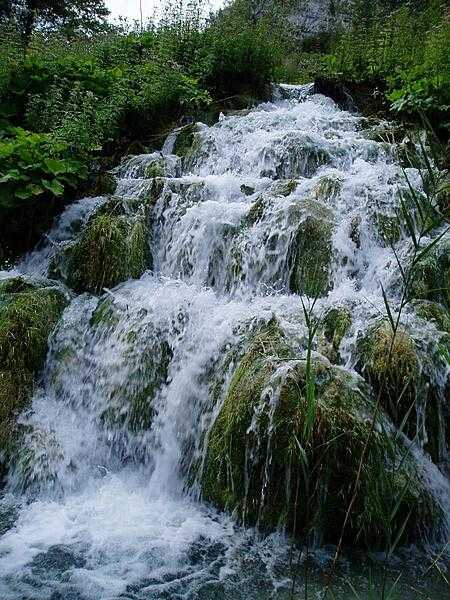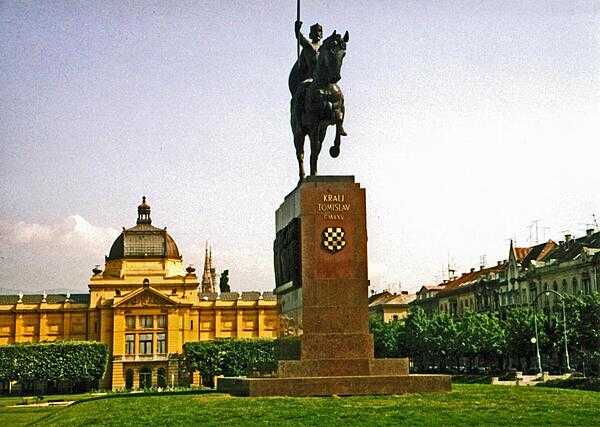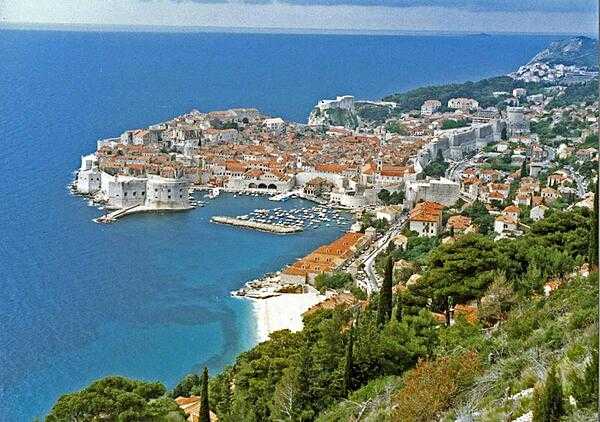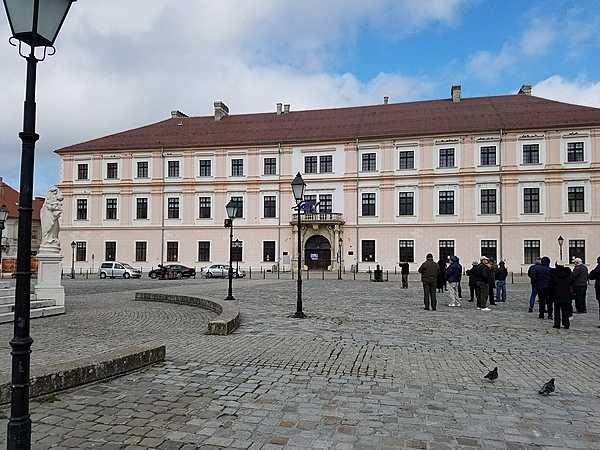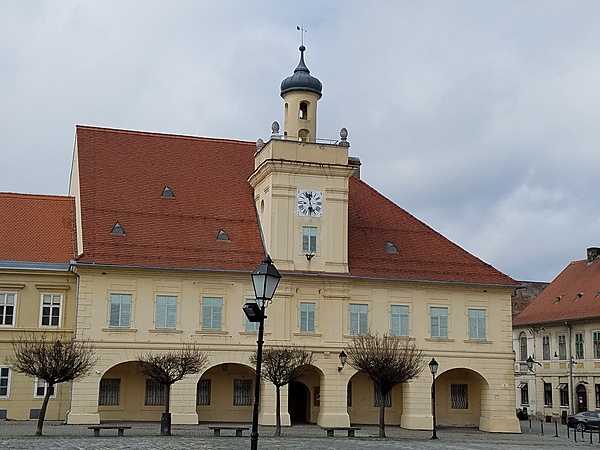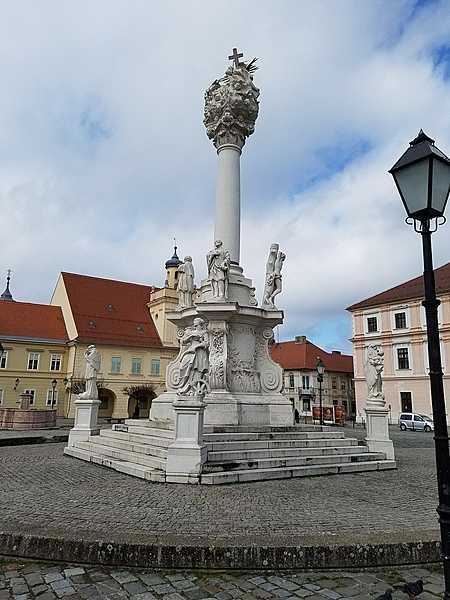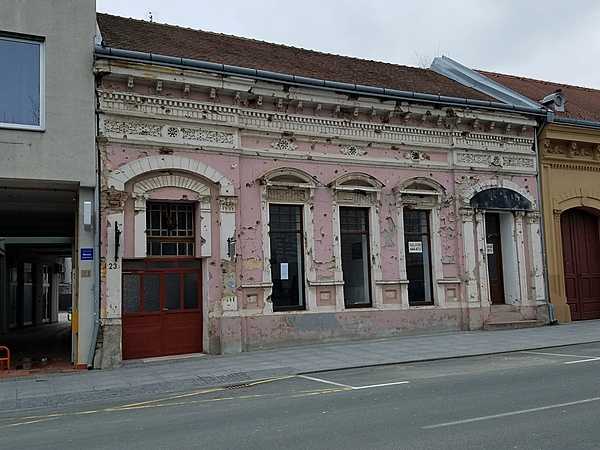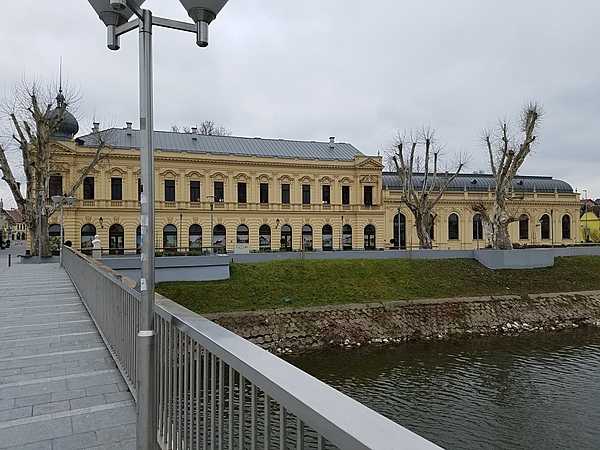Croatia - HR - HRV - CRO - Europe
Last updated: January 21, 2026
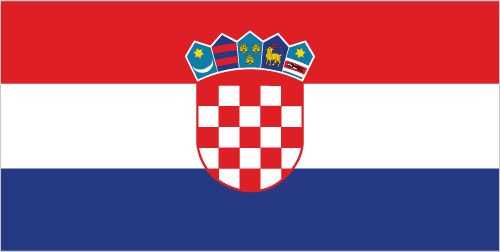
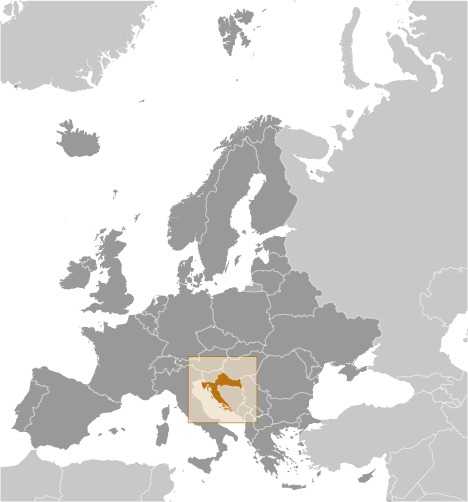
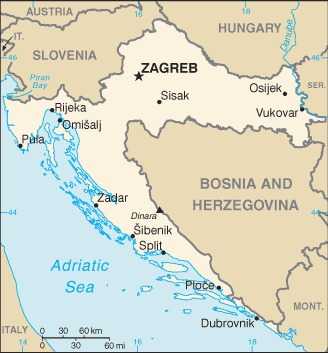
Croatia Images
Croatia Factbook Data
Diplomatic representation from the US
chief of mission: Ambassador Nicole McGRAW (since 21 October 2025)
embassy: Ulica Thomasa Jeffersona 2, 10010 Zagreb
mailing address: 5080 Zagreb Place, Washington DC 20521-5080
telephone: [385] (1) 661-2200
FAX: [385] (1) 665-8933
email address and website:
ZagrebACS@state.gov
https://hr.usembassy.gov/
embassy: Ulica Thomasa Jeffersona 2, 10010 Zagreb
mailing address: 5080 Zagreb Place, Washington DC 20521-5080
telephone: [385] (1) 661-2200
FAX: [385] (1) 665-8933
email address and website:
ZagrebACS@state.gov
https://hr.usembassy.gov/
Age structure
0-14 years: 13.8% (male 296,527/female 278,236)
15-64 years: 63.1% (male 1,307,814/female 1,309,394)
65 years and over: 23.1% (2024 est.) (male 399,090/female 559,055)
15-64 years: 63.1% (male 1,307,814/female 1,309,394)
65 years and over: 23.1% (2024 est.) (male 399,090/female 559,055)
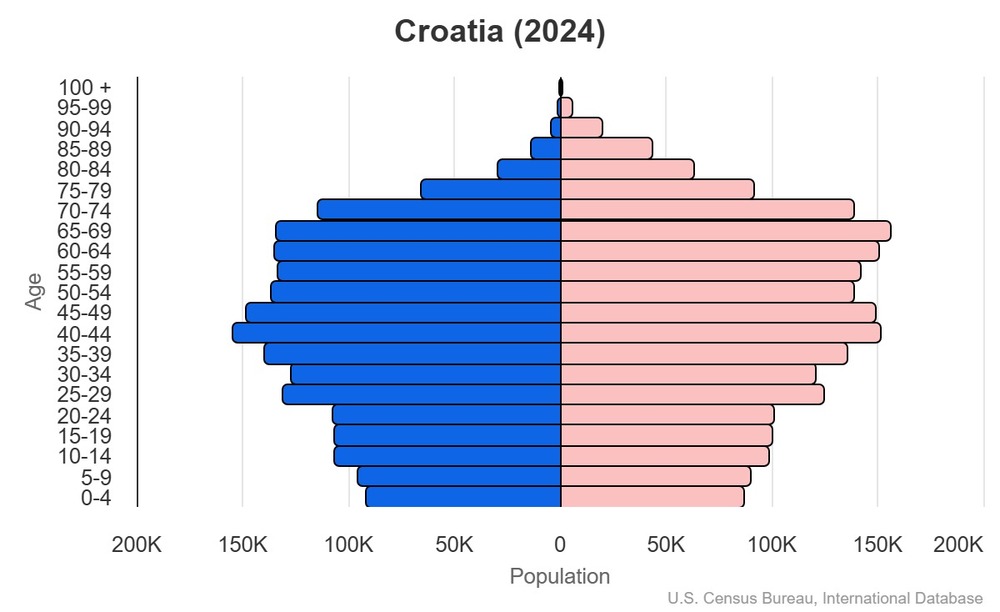
This is the population pyramid for Croatia. A population pyramid illustrates the age and sex structure of a country's population and may provide insights about political and social stability, as well as economic development. The population is distributed along the horizontal axis, with males shown on the left and females on the right. The male and female populations are broken down into 5-year age groups represented as horizontal bars along the vertical axis, with the youngest age groups at the bottom and the oldest at the top. The shape of the population pyramid gradually evolves over time based on fertility, mortality, and international migration trends.
For additional information, please see the entry for Population pyramid on the Definitions and Notes page.
For additional information, please see the entry for Population pyramid on the Definitions and Notes page.
Geographic coordinates
45 10 N, 15 30 E
Sex ratio
at birth: 1.06 male(s)/female
0-14 years: 1.07 male(s)/female
15-64 years: 1 male(s)/female
65 years and over: 0.71 male(s)/female
total population: 0.93 male(s)/female (2024 est.)
0-14 years: 1.07 male(s)/female
15-64 years: 1 male(s)/female
65 years and over: 0.71 male(s)/female
total population: 0.93 male(s)/female (2024 est.)
Natural hazards
destructive earthquakes
Area - comparative
slightly smaller than West Virginia
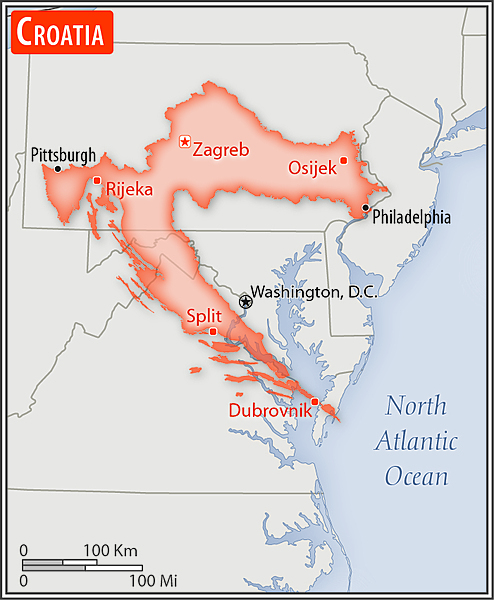
slightly smaller than West Virginia
Military service age and obligation
18-29 years of age for voluntary military service for men and women; conscription abolished in 2008 but will be reinstated in 2026 when it will become mandatory for men aged 19-29 to undergo two months of basic military training (2025)
note: as of 2024, women comprised about 14% of the military's full-time personnel
note: as of 2024, women comprised about 14% of the military's full-time personnel
Background
The lands that today comprise Croatia were part of the Austro-Hungarian Empire until the end of World War I. In 1918, the Croats, Serbs, and Slovenes formed a kingdom known after 1929 as Yugoslavia. Following World War II, Yugoslavia became a federal independent communist state consisting of six socialist republics, including Croatia, under the strong hand of Josip Broz, aka TITO. Although Croatia declared its independence from Yugoslavia in 1991, it took four years of sporadic, but often bitter, fighting before Yugoslav forces were cleared from Croatian lands, along with a majority of Croatia's ethnic Serb population. Under UN supervision, the last Serb-held enclave in eastern Slavonia was returned to Croatia in 1998. The country joined NATO in 2009 and the EU in 2013. In January 2023, Croatia further integrated into the EU by joining the Eurozone and the Schengen Area.
Environmental issues
air pollution in urban areas, as well as emissions from neighboring countries; surface water pollution in the Danube River Basin
International environmental agreements
party to: Air Pollution, Air Pollution-Heavy Metals, Air Pollution-Multi-effect Protocol, Air Pollution-Nitrogen Oxides, Air Pollution-Persistent Organic Pollutants, Air Pollution-Sulphur 94, Air Pollution-Volatile Organic Compounds, Biodiversity, Climate Change, Climate Change-Kyoto Protocol, Climate Change-Paris Agreement, Comprehensive Nuclear Test Ban, Desertification, Endangered Species, Hazardous Wastes, Law of the Sea, Marine Dumping-London Convention, Nuclear Test Ban, Ozone Layer Protection, Ship Pollution, Tropical Timber 2006, Wetlands, Whaling
signed, but not ratified: none of the selected agreements
signed, but not ratified: none of the selected agreements
Military expenditures
2% of GDP (2025 est.)
1.9% of GDP (2024 est.)
1.7% of GDP (2023 est.)
1.8% of GDP (2022 est.)
2% of GDP (2021 est.)
1.9% of GDP (2024 est.)
1.7% of GDP (2023 est.)
1.8% of GDP (2022 est.)
2% of GDP (2021 est.)
Population below poverty line
18% (2021 est.)
note: % of population with income below national poverty line
note: % of population with income below national poverty line
Household income or consumption by percentage share
lowest 10%: 2.9% (2022 est.)
highest 10%: 23% (2022 est.)
note: % share of income accruing to lowest and highest 10% of population
highest 10%: 23% (2022 est.)
note: % share of income accruing to lowest and highest 10% of population
Exports - commodities
ships, garments, electricity, packaged medicine, wood (2023)
note: top five export commodities based on value in dollars
note: top five export commodities based on value in dollars
Exports - partners
Italy 14%, Germany 11%, Slovenia 11%, Bosnia & Herzegovina 6%, Austria 6% (2023)
note: top five export partners based on percentage share of exports
note: top five export partners based on percentage share of exports
Administrative divisions
20 counties (zupanije, singular - zupanija) and 1 city* (grad - singular) with special county status; Bjelovarsko-Bilogorska (Bjelovar-Bilogora), Brodsko-Posavska (Brod-Posavina), Dubrovacko-Neretvanska (Dubrovnik-Neretva), Istarska (Istria), Karlovacka (Karlovac), Koprivnicko-Krizevacka (Koprivnica-Krizevci), Krapinsko-Zagorska (Krapina-Zagorje), Licko-Senjska (Lika-Senj), Medimurska (Medimurje), Osjecko-Baranjska (Osijek-Baranja), Pozesko-Slavonska (Pozega-Slavonia), Primorsko-Goranska (Primorje-Gorski Kotar), Sibensko-Kninska (Sibenik-Knin), Sisacko-Moslavacka (Sisak-Moslavina), Splitsko-Dalmatinska (Split-Dalmatia), Varazdinska (Varazdin), Viroviticko-Podravska (Virovitica-Podravina), Vukovarsko-Srijemska (Vukovar-Syrmia), Zadarska (Zadar), Zagreb*, Zagrebacka (Zagreb county)
Agricultural products
maize, wheat, sugar beets, milk, barley, soybeans, sunflower seeds, potatoes, pork, grapes (2023)
note: top ten agricultural products based on tonnage
note: top ten agricultural products based on tonnage
Military and security forces
Armed Forces of the Republic of Croatia (Oruzane Snage Republike Hrvatske, OSRH): Croatian Army (Hrvatska Kopnena Vojska, HKoV), Croatian Navy (Hrvatska Ratna Mornarica, HRM; includes Coast Guard), Croatian Air Force (Hrvatsko Ratno Zrakoplovstvo, HRZ) (2025)
note: the Ministry of the Interior is responsible for internal security, including law enforcement (Croatia Police) and border security
note: the Ministry of the Interior is responsible for internal security, including law enforcement (Croatia Police) and border security
Budget
revenues: $32.487 billion (2023 est.)
expenditures: $33.715 billion (2023 est.)
note: central government revenues (excluding grants) and expenditures converted to US dollars at average official exchange rate for year indicated
expenditures: $33.715 billion (2023 est.)
note: central government revenues (excluding grants) and expenditures converted to US dollars at average official exchange rate for year indicated
Capital
name: Zagreb
geographic coordinates: 45 48 N, 16 00 E
time difference: UTC+1 (6 hours ahead of Washington, DC, during Standard Time)
daylight saving time: +1hr, begins last Sunday in March; ends last Sunday in October
etymology: the city's name means "beyond the bank (or ditch)"; za in Old Croat means "beyond," and greb means "bank" or "ditch," relating to the city's original site above the Sava River
geographic coordinates: 45 48 N, 16 00 E
time difference: UTC+1 (6 hours ahead of Washington, DC, during Standard Time)
daylight saving time: +1hr, begins last Sunday in March; ends last Sunday in October
etymology: the city's name means "beyond the bank (or ditch)"; za in Old Croat means "beyond," and greb means "bank" or "ditch," relating to the city's original site above the Sava River
Imports - commodities
refined petroleum, cars, garments, natural gas, crude petroleum (2023)
note: top five import commodities based on value in dollars
note: top five import commodities based on value in dollars
Climate
Mediterranean and continental; continental climate predominant with hot summers and cold winters; mild winters, dry summers along coast
Coastline
5,835 km (mainland 1,777 km; islands 4,058 km)
Constitution
history: several previous; latest adopted 22 December 1990
amendment process: proposed by at least one fifth of the Assembly membership, by the president of the republic, by the Government of Croatia, or through petition by at least 10% of the total electorate; proceedings to amend require majority vote by the Assembly; passage requires two-thirds majority vote by the Assembly; passage by petition requires a majority vote in a referendum and promulgation by the Assembly
amendment process: proposed by at least one fifth of the Assembly membership, by the president of the republic, by the Government of Croatia, or through petition by at least 10% of the total electorate; proceedings to amend require majority vote by the Assembly; passage requires two-thirds majority vote by the Assembly; passage by petition requires a majority vote in a referendum and promulgation by the Assembly
Exchange rates
euros (EUR) per US dollar -
Exchange rates:
0.924 (2024 est.)
0.925 (2023 est.)
0.95 (2022 est.)
0.845 (2021 est.)
0.876 (2020 est.)
note: Croatia used the kuna prior to conversion to the euro on 1 January 2023. During the transition period the exchange rate was fixed at 7.53450 kuna to 1 euro.
Exchange rates:
0.924 (2024 est.)
0.925 (2023 est.)
0.95 (2022 est.)
0.845 (2021 est.)
0.876 (2020 est.)
note: Croatia used the kuna prior to conversion to the euro on 1 January 2023. During the transition period the exchange rate was fixed at 7.53450 kuna to 1 euro.
Executive branch
chief of state: President Zoran MILANOVIC (since 18 February 2020)
head of government: Prime Minister Andrej PLENKOVIC (since 19 October 2016)
cabinet: Council of Ministers named by the prime minister and approved by the Assembly
election/appointment process: president directly elected by absolute-majority popular vote in 2 rounds, if needed, for a 5-year term (eligible for a second term); the leader of the majority party or majority coalition is usually appointed prime minister by the president and approved by the Assembly
most recent election date: December 2024 (first round) and January 2025 (second round)
election results:
2025: Zoran MILANOVIC elected president in second round; percent of vote in second round - Zoran MILANOVIC (SDP) 74.6%, Dragan PRIMORAC (independent) 25.3%
2019: Zoran MILANOVIC elected president in second round; percent of vote in second round - Zoran MILANOVIC (SDP) 52.7%, Kolinda GRABAR-KITAROVIC (HDZ) 47.3%
expected date of next election: 2029
head of government: Prime Minister Andrej PLENKOVIC (since 19 October 2016)
cabinet: Council of Ministers named by the prime minister and approved by the Assembly
election/appointment process: president directly elected by absolute-majority popular vote in 2 rounds, if needed, for a 5-year term (eligible for a second term); the leader of the majority party or majority coalition is usually appointed prime minister by the president and approved by the Assembly
most recent election date: December 2024 (first round) and January 2025 (second round)
election results:
2025: Zoran MILANOVIC elected president in second round; percent of vote in second round - Zoran MILANOVIC (SDP) 74.6%, Dragan PRIMORAC (independent) 25.3%
2019: Zoran MILANOVIC elected president in second round; percent of vote in second round - Zoran MILANOVIC (SDP) 52.7%, Kolinda GRABAR-KITAROVIC (HDZ) 47.3%
expected date of next election: 2029
Flag
description: three equal horizontal bands of red (top), white, and blue -- the pan-Slav colors -- with the Croatian coat of arms in the center, which consists of a main shield (a checkerboard of 13 red and 12 silver fields) with five smaller shields that form a crown over the main shield
meaning: the small shields represent the five historic regions (from left to right): Croatia, Dubrovnik, Dalmatia, Istria, and Slavonia
history: Russia's 19th-century flag inspired the pan-Slav colors
meaning: the small shields represent the five historic regions (from left to right): Croatia, Dubrovnik, Dalmatia, Istria, and Slavonia
history: Russia's 19th-century flag inspired the pan-Slav colors
Independence
25 June 1991 (from Yugoslavia); notable earlier dates: ca. 925 (Kingdom of Croatia established), 1 December 1918 (Kingdom of Serbs, Croats, and Slovenes established, later became Yugoslavia)
note: 25 June 1991 was the day the Croatian parliament voted for independence; the legislature adopted a decision on 8 October 1991 to sever constitutional relations with Yugoslavia
note: 25 June 1991 was the day the Croatian parliament voted for independence; the legislature adopted a decision on 8 October 1991 to sever constitutional relations with Yugoslavia
Industries
chemicals and plastics, machine tools, fabricated metal, electronics, pig iron and rolled steel products, aluminum, paper, wood products, construction materials, textiles, shipbuilding, petroleum and petroleum refining, food and beverages, tourism
Judicial branch
highest court(s): Supreme Court (consists of the court president and vice president, 25 civil department justices, and 16 criminal department justices)
judge selection and term of office: president of Supreme Court nominated by the president of Croatia and elected by the Sabor for a 4-year term; other Supreme Court justices appointed by the National Judicial Council; all judges serve until age 70
subordinate courts: Administrative Court; county, municipal, and specialized courts
note: an 11-member Constitutional Court has jurisdiction limited to constitutional issues, but it is outside the judicial system
judge selection and term of office: president of Supreme Court nominated by the president of Croatia and elected by the Sabor for a 4-year term; other Supreme Court justices appointed by the National Judicial Council; all judges serve until age 70
subordinate courts: Administrative Court; county, municipal, and specialized courts
note: an 11-member Constitutional Court has jurisdiction limited to constitutional issues, but it is outside the judicial system
Land boundaries
total: 2,237 km
border countries (5): Bosnia and Herzegovina 956 km; Hungary 348 km; Montenegro 19 km; Serbia 314 km; Slovenia 600 km
border countries (5): Bosnia and Herzegovina 956 km; Hungary 348 km; Montenegro 19 km; Serbia 314 km; Slovenia 600 km
Land use
agricultural land: 26.6% (2023 est.)
arable land: 15.5% (2023 est.)
permanent crops: 1.4% (2023 est.)
permanent pasture: 9.6% (2023 est.)
forest: 34.7% (2023 est.)
other: 38.2% (2023 est.)
arable land: 15.5% (2023 est.)
permanent crops: 1.4% (2023 est.)
permanent pasture: 9.6% (2023 est.)
forest: 34.7% (2023 est.)
other: 38.2% (2023 est.)
Legal system
civil law system influenced by legal heritage of Austria-Hungary
Legislative branch
legislature name: Croatian Parliament (Hrvatski Sabor)
legislative structure: unicameral
number of seats: 151 (all directly elected)
electoral system: proportional representation
scope of elections: full renewal
term in office: 4 years
most recent election date: 4/17/2024
parties elected and seats per party: Croatian Democratic Union (HDZ) (55); Social Democratic Party of Croatia (SDP) (37); Homeland Movement (DP) (11); We Can! – Political Platform (Možemo!) (10); Bridge (Most) (7); Other (20)
percentage of women in chamber: 33.1%
expected date of next election: April 2028
note: of the 151 seats, 140 members come from 10 multi-seat constituencies, with 3 members in a constituency for Croatian diaspora; voters belonging to recognized minorities elect an additional 8 members from a nationwide constituency: the Serb minority elects 3 members, the Hungarian and Italian minorities elect 1 each, the Czech and Slovak minorities elect 1 jointly, and all other minorities elect 2
legislative structure: unicameral
number of seats: 151 (all directly elected)
electoral system: proportional representation
scope of elections: full renewal
term in office: 4 years
most recent election date: 4/17/2024
parties elected and seats per party: Croatian Democratic Union (HDZ) (55); Social Democratic Party of Croatia (SDP) (37); Homeland Movement (DP) (11); We Can! – Political Platform (Možemo!) (10); Bridge (Most) (7); Other (20)
percentage of women in chamber: 33.1%
expected date of next election: April 2028
note: of the 151 seats, 140 members come from 10 multi-seat constituencies, with 3 members in a constituency for Croatian diaspora; voters belonging to recognized minorities elect an additional 8 members from a nationwide constituency: the Serb minority elects 3 members, the Hungarian and Italian minorities elect 1 each, the Czech and Slovak minorities elect 1 jointly, and all other minorities elect 2
Maritime claims
territorial sea: 12 nm
continental shelf: 200-m depth or to the depth of exploitation
continental shelf: 200-m depth or to the depth of exploitation
International organization participation
AIIB, Australia Group, BIS, BSEC (observer), CD, CE, CEI, EAPC, EBRD, ECB, EMU, EU, FAO, G-11, IADB, IAEA, IBRD, ICAO, ICC (national committees), ICCt, ICRM, IDA, IFAD, IFC, IFRCS, IHO, ILO, IMF, IMO, IMSO, Interpol, IOC, IOM, IPU, ISO, ITSO, ITU, ITUC (NGOs), MIGA, MINURSO, NAM (observer), NATO, NSG, OAS (observer), OIF (observer), OPCW, OSCE, PCA, Schengen Convention, SELEC, UN, UNCTAD, UNESCO, UNFICYP, UNHCR, UNIDO, UNIFIL, UNMIL, UNMOGIP, UNWTO, UPU, Wassenaar Arrangement, WCO, WHO, WIPO, WMO, WTO, ZC
National holiday
Statehood Day (National Day), 30 May (1990)
note: marks the day in 1990 that the first modern multi-party Croatian parliament convened
note: marks the day in 1990 that the first modern multi-party Croatian parliament convened
Nationality
noun: Croat(s), Croatian(s)
adjective: Croatian
note: the French designation of "Croate" to Croatian mercenaries in the 17th century eventually became "Cravate" and later came to be applied to the soldiers' scarves - the cravat; Croatia celebrates Cravat Day every 18 October
adjective: Croatian
note: the French designation of "Croate" to Croatian mercenaries in the 17th century eventually became "Cravate" and later came to be applied to the soldiers' scarves - the cravat; Croatia celebrates Cravat Day every 18 October
Natural resources
oil, some coal, bauxite, low-grade iron ore, calcium, gypsum, natural asphalt, silica, mica, clays, salt, hydropower
Geography - note
controls most land routes from Western Europe to the Aegean Sea and Turkish Straits; most Adriatic Sea islands lie off the coast of Croatia -- some 1,200 islands, islets, ridges, and rocks
Economic overview
upper-middle-income Balkan economy; newest euro user (introduced in 2023); increased investments from EU structural funds and tourism sector contributing to strong but moderating economic growth; declining energy prices and restrictive monetary policy easing inflation; historically low unemployment rate with labor shortages within services and manufacturing sectors
Political parties
Bosniaks Together
The Bridge or MOST (formerly the Bridge of Independent Lists)
Croatia Romani Union Kali Sara (SRRH)
Croatian Democratic Union or HDZ
Democratic Union of Hungarians in Croatia (DZMH)
Focus or Fokus
Homeland Movement or DP (also known as Miroslav Škoro Homeland Movement or DPMS)
Independent Democratic Serb Party or SDSS
Independent Platform of the North (NPS)
Istrian Democratic Assembly or IDS
Social Democratic Party of Croatia or SDP
We Can! or Mozemo!
The Bridge or MOST (formerly the Bridge of Independent Lists)
Croatia Romani Union Kali Sara (SRRH)
Croatian Democratic Union or HDZ
Democratic Union of Hungarians in Croatia (DZMH)
Focus or Fokus
Homeland Movement or DP (also known as Miroslav Škoro Homeland Movement or DPMS)
Independent Democratic Serb Party or SDSS
Independent Platform of the North (NPS)
Istrian Democratic Assembly or IDS
Social Democratic Party of Croatia or SDP
We Can! or Mozemo!
Railways
total: 2,617 km (2020) 980 km electrified
Suffrage
18 years of age; universal
Terrain
geographically diverse; flat plains along Hungarian border, low mountains and highlands near Adriatic coastline and islands
Government type
parliamentary republic
Country name
conventional long form: Republic of Croatia
conventional short form: Croatia
local long form: Republika Hrvatska
local short form: Hrvatska
former: People's Republic of Croatia, Socialist Republic of Croatia
etymology: name probably derives from the Croats, a Slavic tribe who migrated to the Balkans in the 7th century A.D., but that name may be related to the Russian word khrebet, meaning "mountain chain"
conventional short form: Croatia
local long form: Republika Hrvatska
local short form: Hrvatska
former: People's Republic of Croatia, Socialist Republic of Croatia
etymology: name probably derives from the Croats, a Slavic tribe who migrated to the Balkans in the 7th century A.D., but that name may be related to the Russian word khrebet, meaning "mountain chain"
Location
Southeastern Europe, bordering the Adriatic Sea, between Bosnia and Herzegovina and Slovenia
Map references
Europe
Irrigated land
170 sq km (2022)
Diplomatic representation in the US
chief of mission: Ambassador Pjer ŠIMUNOVIĆ (since 8 September 2017)
chancery: 2343 Massachusetts Avenue NW, Washington, DC 20008
telephone: [1] (202) 588-5899
FAX: [1] (202) 588-8937
email address and website:
washington@mvep.hr
https://mvep.gov.hr/embassy-114969/114969
consulate(s) general: Chicago, Los Angeles, New York, Seattle (WA)
consulate(s): Anchorage (AL), Houston, Kansas City (MO),Minneapolis/St. Paul (MN), New Orleans, Pittsburgh (PA)
chancery: 2343 Massachusetts Avenue NW, Washington, DC 20008
telephone: [1] (202) 588-5899
FAX: [1] (202) 588-8937
email address and website:
washington@mvep.hr
https://mvep.gov.hr/embassy-114969/114969
consulate(s) general: Chicago, Los Angeles, New York, Seattle (WA)
consulate(s): Anchorage (AL), Houston, Kansas City (MO),Minneapolis/St. Paul (MN), New Orleans, Pittsburgh (PA)
Internet users
percent of population: 83% (2023 est.)
Internet country code
.hr
Refugees and internally displaced persons
refugees: 29,927 (2024 est.)
stateless persons: 758 (2024 est.)
stateless persons: 758 (2024 est.)
GDP (official exchange rate)
$92.526 billion (2024 est.)
note: data in current dollars at official exchange rate
note: data in current dollars at official exchange rate
Total renewable water resources
105.5 billion cubic meters (2022 est.)
School life expectancy (primary to tertiary education)
total: 16 years (2022 est.)
male: 15 years (2022 est.)
female: 17 years (2022 est.)
male: 15 years (2022 est.)
female: 17 years (2022 est.)
Urbanization
urban population: 58.6% of total population (2023)
rate of urbanization: 0.05% annual rate of change (2020-25 est.)
rate of urbanization: 0.05% annual rate of change (2020-25 est.)
Broadcast media
the national state-owned public broadcaster, Croatian Radiotelevision, operates 4 terrestrial TV networks, a satellite channel that rebroadcasts programs for Croatians overseas, and 6 regional TV centers; 2 private broadcasters with national terrestrial networks; 29 privately owned regional TV stations; multi-channel cable and satellite TV subscription services are available; state-owned public broadcaster operates 4 national radio networks and 23 regional radio stations; 2 privately owned national radio networks and 117 local radio stations (2019)
Drinking water source
improved:
urban: 100% of population (2022 est.)
unimproved:
urban: 0% of population (2022 est.)
urban: 100% of population (2022 est.)
unimproved:
urban: 0% of population (2022 est.)
National anthem(s)
title: "Lijepa nasa domovino" (Our Beautiful Homeland)
lyrics/music: Antun MIHANOVIC/Josip RUNJANIN
history: adopted in 1972 while still part of Yugoslavia; the lyrics were written in 1835, and it served as an unofficial anthem beginning in 1891
lyrics/music: Antun MIHANOVIC/Josip RUNJANIN
history: adopted in 1972 while still part of Yugoslavia; the lyrics were written in 1835, and it served as an unofficial anthem beginning in 1891
This is an audio of the National Anthem for Croatia. The national anthem is generally a patriotic musical composition - usually in the form of a song or hymn of praise - that evokes and eulogizes the history, traditions, or struggles of a nation or its people. National anthems can be officially recognized as a national song by a country's constitution or by an enacted law, or simply by tradition. Although most anthems contain lyrics, some do not.
Major urban areas - population
684,000 ZAGREB (capital) (2023)
International law organization participation
has not submitted an ICJ jurisdiction declaration; accepts ICCt jurisdiction
Physician density
3.91 physicians/1,000 population (2022)
Hospital bed density
5.6 beds/1,000 population (2020 est.)
National symbol(s)
red-and-white checkerboard
Mother's mean age at first birth
29 years (2020 est.)
GDP - composition, by end use
household consumption: 57% (2024 est.)
government consumption: 22.6% (2024 est.)
investment in fixed capital: 23.7% (2024 est.)
investment in inventories: -0.2% (2024 est.)
exports of goods and services: 49.8% (2024 est.)
imports of goods and services: -52.9% (2024 est.)
note: figures may not total 100% due to rounding or gaps in data collection
government consumption: 22.6% (2024 est.)
investment in fixed capital: 23.7% (2024 est.)
investment in inventories: -0.2% (2024 est.)
exports of goods and services: 49.8% (2024 est.)
imports of goods and services: -52.9% (2024 est.)
note: figures may not total 100% due to rounding or gaps in data collection
Citizenship
citizenship by birth: no
citizenship by descent only: at least one parent must be a citizen of Croatia
dual citizenship recognized: yes
residency requirement for naturalization: 5 years
citizenship by descent only: at least one parent must be a citizen of Croatia
dual citizenship recognized: yes
residency requirement for naturalization: 5 years
Population distribution
more of the population lives in the northern half of the country, with approximately a quarter of the populace residing in and around the capital of Zagreb; many of the islands are sparsely populated
Electricity access
electrification - total population: 100% (2022 est.)
Civil aircraft registration country code prefix
9A
Ethnic groups
Croat 91.6%, Serb 3.2%, other 3.9% (including Bosniak, Romani, Albanian, Italian, and Hungarian), unspecified 1.3% (2021 est.)
Religions
Roman Catholic 79%, Orthodox 3.3%, Protestant 0.3%, other Christian 4.8%, Muslim 1.3%, other 1.1%, agnostic 1.7%, none or atheist 4.7%, unspecified 3.9% (2021 est.)
Languages
Croatian (official) 95.2%, Serbian 1.2%, other 3.1% (including Bosnian, Romani, Albanian, and Italian) unspecified 0.5% (2021 est.)
major-language sample(s):
Knjiga svjetskih činjenica, nužan izvor osnovnih informacija. (Croatian)
The World Factbook, the indispensable source for basic information.
major-language sample(s):
Knjiga svjetskih činjenica, nužan izvor osnovnih informacija. (Croatian)
The World Factbook, the indispensable source for basic information.
Croatian audio sample
Imports - partners
Italy 14%, Germany 14%, Slovenia 11%, Hungary 6%, Austria 5% (2023)
note: top five import partners based on percentage share of imports
note: top five import partners based on percentage share of imports
Elevation
highest point: Dinara 1,831 m
lowest point: Adriatic Sea 0 m
mean elevation: 331 m
lowest point: Adriatic Sea 0 m
mean elevation: 331 m
Health expenditure
8.1% of GDP (2021)
13.7% of national budget (2022 est.)
13.7% of national budget (2022 est.)
Military and security service personnel strengths
approximately 15,000 active-duty military personnel (2025)
Military equipment inventories and acquisitions
the military's inventory is a mix of Soviet-era (largely from the former Yugoslavia) equipment and a growing amount of more modern, NATO-compatible weapon systems from suppliers such as France, Germany, Türkiye, and the US (2025)
Military deployments
150 Kosovo (KFOR/NATO); also has a few hundred personnel participating in several other EU, NATO, and UN missions (2025)
Total water withdrawal
municipal: 465 million cubic meters (2022)
industrial: 475 million cubic meters (2022)
agricultural: 76 million cubic meters (2022)
industrial: 475 million cubic meters (2022)
agricultural: 76 million cubic meters (2022)
Waste and recycling
municipal solid waste generated annually: 1.81 million tons (2024 est.)
percent of municipal solid waste recycled: 20% (2022 est.)
percent of municipal solid waste recycled: 20% (2022 est.)
Average household expenditures
on food: 18.5% of household expenditures (2023 est.)
on alcohol and tobacco: 7.9% of household expenditures (2023 est.)
on alcohol and tobacco: 7.9% of household expenditures (2023 est.)
Major watersheds (area sq km)
Atlantic Ocean drainage: (Black Sea) Danube (795,656 sq km)
Major rivers (by length in km)
Dunav (Danube) (shared with Germany [s], Austria, Slovakia, Hungary, Serbia, Bulgaria, Ukraine, Moldova, and Romania [m]) - 2,888 km
note: [s] after country name indicates river source; [m] after country name indicates river mouth
note: [s] after country name indicates river source; [m] after country name indicates river mouth
National heritage
total World Heritage Sites: 10 (8 cultural, 2 natural)
selected World Heritage Site locales: Plitvice Lakes National Park (n); Historic Split (c); Old City of Dubrovnik (c); Euphrasian Basilica; Historic Trogir (c); Šibenik Cathedral (c); Stari Grad Plain (c); Zadar and Fort St. Nikola Venetian Defense Works (c); Primeval Beech Forests (n); Stećci Medieval Tombstones Graveyards (c)
selected World Heritage Site locales: Plitvice Lakes National Park (n); Historic Split (c); Old City of Dubrovnik (c); Euphrasian Basilica; Historic Trogir (c); Šibenik Cathedral (c); Stari Grad Plain (c); Zadar and Fort St. Nikola Venetian Defense Works (c); Primeval Beech Forests (n); Stećci Medieval Tombstones Graveyards (c)
Coal
consumption: 596,000 metric tons (2023 est.)
exports: 1,000 metric tons (2022 est.)
imports: 663,000 metric tons (2023 est.)
exports: 1,000 metric tons (2022 est.)
imports: 663,000 metric tons (2023 est.)
Electricity generation sources
fossil fuels: 31.2% of total installed capacity (2023 est.)
solar: 1.7% of total installed capacity (2023 est.)
wind: 14.8% of total installed capacity (2023 est.)
hydroelectricity: 48.5% of total installed capacity (2023 est.)
geothermal: 0.1% of total installed capacity (2023 est.)
biomass and waste: 3.7% of total installed capacity (2023 est.)
solar: 1.7% of total installed capacity (2023 est.)
wind: 14.8% of total installed capacity (2023 est.)
hydroelectricity: 48.5% of total installed capacity (2023 est.)
geothermal: 0.1% of total installed capacity (2023 est.)
biomass and waste: 3.7% of total installed capacity (2023 est.)
Natural gas
production: 722.231 million cubic meters (2023 est.)
consumption: 2.689 billion cubic meters (2023 est.)
exports: 1.119 billion cubic meters (2023 est.)
imports: 2.995 billion cubic meters (2023 est.)
proven reserves: 24.919 billion cubic meters (2021 est.)
consumption: 2.689 billion cubic meters (2023 est.)
exports: 1.119 billion cubic meters (2023 est.)
imports: 2.995 billion cubic meters (2023 est.)
proven reserves: 24.919 billion cubic meters (2021 est.)
Petroleum
total petroleum production: 11,000 bbl/day (2023 est.)
refined petroleum consumption: 70,000 bbl/day (2023 est.)
crude oil estimated reserves: 71 million barrels (2021 est.)
refined petroleum consumption: 70,000 bbl/day (2023 est.)
crude oil estimated reserves: 71 million barrels (2021 est.)
Gross reproduction rate
0.69 (2025 est.)
Currently married women (ages 15-49)
50.1% (2021 est.)
Remittances
7.3% of GDP (2024 est.)
7.2% of GDP (2023 est.)
7.5% of GDP (2022 est.)
note: personal transfers and compensation between resident and non-resident individuals/households/entities
7.2% of GDP (2023 est.)
7.5% of GDP (2022 est.)
note: personal transfers and compensation between resident and non-resident individuals/households/entities
Geoparks
total global geoparks and regional networks: 3 (2024)
global geoparks and regional networks: Biokovo-Imotski Lakes; Papuk; Vis Archipelago (2024)
global geoparks and regional networks: Biokovo-Imotski Lakes; Papuk; Vis Archipelago (2024)
Ports
total ports: 16 (2024)
large: 2
medium: 0
small: 6
very small: 8
ports with oil terminals: 8
key ports: Bakar, Dubrovnik, Omisalj, Rijeka Luka, Rovinj, Sibenik, Split, Zadar
large: 2
medium: 0
small: 6
very small: 8
ports with oil terminals: 8
key ports: Bakar, Dubrovnik, Omisalj, Rijeka Luka, Rovinj, Sibenik, Split, Zadar
National color(s)
red, white, blue
Particulate matter emissions
15.2 micrograms per cubic meter (2019 est.)
Labor force
1.733 million (2024 est.)
note: number of people ages 15 or older who are employed or seeking work
note: number of people ages 15 or older who are employed or seeking work
Youth unemployment rate (ages 15-24)
total: 16.6% (2024 est.)
male: 15.5% (2024 est.)
female: 18.2% (2024 est.)
note: % of labor force ages 15-24 seeking employment
male: 15.5% (2024 est.)
female: 18.2% (2024 est.)
note: % of labor force ages 15-24 seeking employment
Net migration rate
-0.87 migrant(s)/1,000 population (2025 est.)
Median age
total: 44.9 years (2025 est.)
male: 43.2 years
female: 47 years
male: 43.2 years
female: 47 years
Maternal mortality ratio
3 deaths/100,000 live births (2023 est.)
Reserves of foreign exchange and gold
$3.336 billion (2024 est.)
$3.176 billion (2023 est.)
$29.726 billion (2022 est.)
note: holdings of gold (year-end prices)/foreign exchange/special drawing rights in current dollars
$3.176 billion (2023 est.)
$29.726 billion (2022 est.)
note: holdings of gold (year-end prices)/foreign exchange/special drawing rights in current dollars
Public debt
75.6% of GDP (2023 est.)
note: central government debt as a % of GDP
note: central government debt as a % of GDP
Total fertility rate
1.43 children born/woman (2025 est.)
Unemployment rate
5.3% (2024 est.)
6.1% (2023 est.)
7% (2022 est.)
note: % of labor force seeking employment
6.1% (2023 est.)
7% (2022 est.)
note: % of labor force seeking employment
Carbon dioxide emissions
16.467 million metric tonnes of CO2 (2023 est.)
from coal and metallurgical coke: 1.335 million metric tonnes of CO2 (2023 est.)
from petroleum and other liquids: 9.858 million metric tonnes of CO2 (2023 est.)
from consumed natural gas: 5.275 million metric tonnes of CO2 (2023 est.)
from coal and metallurgical coke: 1.335 million metric tonnes of CO2 (2023 est.)
from petroleum and other liquids: 9.858 million metric tonnes of CO2 (2023 est.)
from consumed natural gas: 5.275 million metric tonnes of CO2 (2023 est.)
Area
total : 56,594 sq km
land: 55,974 sq km
water: 620 sq km
land: 55,974 sq km
water: 620 sq km
Taxes and other revenues
21.5% (of GDP) (2023 est.)
note: central government tax revenue as a % of GDP
note: central government tax revenue as a % of GDP
Real GDP (purchasing power parity)
$164.825 billion (2024 est.)
$158.769 billion (2023 est.)
$153.693 billion (2022 est.)
note: data in 2021 dollars
$158.769 billion (2023 est.)
$153.693 billion (2022 est.)
note: data in 2021 dollars
Airports
45 (2025)
Infant mortality rate
total: 3.4 deaths/1,000 live births (2025 est.)
male: 8.2 deaths/1,000 live births
female: 8.7 deaths/1,000 live births
male: 8.2 deaths/1,000 live births
female: 8.7 deaths/1,000 live births
Gini Index coefficient - distribution of family income
30 (2022 est.)
note: index (0-100) of income distribution; higher values represent greater inequality
note: index (0-100) of income distribution; higher values represent greater inequality
Inflation rate (consumer prices)
3% (2024 est.)
7.9% (2023 est.)
10.8% (2022 est.)
note: annual % change based on consumer prices
7.9% (2023 est.)
10.8% (2022 est.)
note: annual % change based on consumer prices
Current account balance
-$1.049 billion (2024 est.)
$635.97 million (2023 est.)
-$2.621 billion (2022 est.)
note: balance of payments - net trade and primary/secondary income in current dollars
$635.97 million (2023 est.)
-$2.621 billion (2022 est.)
note: balance of payments - net trade and primary/secondary income in current dollars
Real GDP per capita
$42,600 (2024 est.)
$41,100 (2023 est.)
$39,900 (2022 est.)
note: data in 2021 dollars
$41,100 (2023 est.)
$39,900 (2022 est.)
note: data in 2021 dollars
Broadband - fixed subscriptions
total: 1.11 million (2023 est.)
subscriptions per 100 inhabitants: 28 (2023 est.)
subscriptions per 100 inhabitants: 28 (2023 est.)
Tobacco use
total: 32.8% (2025 est.)
male: 33.6% (2025 est.)
female: 32.1% (2025 est.)
male: 33.6% (2025 est.)
female: 32.1% (2025 est.)
Obesity - adult prevalence rate
24.4% (2016)
Energy consumption per capita
79.907 million Btu/person (2023 est.)
Death rate
12.87 deaths/1,000 population (2025 est.)
Birth rate
8.49 births/1,000 population (2025 est.)
Electricity
installed generating capacity: 5.518 million kW (2023 est.)
consumption: 16.408 billion kWh (2023 est.)
exports: 8.461 billion kWh (2023 est.)
imports: 10.038 billion kWh (2023 est.)
transmission/distribution losses: 2.053 billion kWh (2023 est.)
consumption: 16.408 billion kWh (2023 est.)
exports: 8.461 billion kWh (2023 est.)
imports: 10.038 billion kWh (2023 est.)
transmission/distribution losses: 2.053 billion kWh (2023 est.)
Merchant marine
total: 384 (2023)
by type: bulk carrier 10, general cargo 32, oil tanker 14, other 328
by type: bulk carrier 10, general cargo 32, oil tanker 14, other 328
Imports
$49.86 billion (2024 est.)
$46.811 billion (2023 est.)
$46.769 billion (2022 est.)
note: balance of payments - imports of goods and services in current dollars
$46.811 billion (2023 est.)
$46.769 billion (2022 est.)
note: balance of payments - imports of goods and services in current dollars
Exports
$46.601 billion (2024 est.)
$45.064 billion (2023 est.)
$41.907 billion (2022 est.)
note: balance of payments - exports of goods and services in current dollars
$45.064 billion (2023 est.)
$41.907 billion (2022 est.)
note: balance of payments - exports of goods and services in current dollars
Heliports
7 (2025)
Alcohol consumption per capita
total: 9.64 liters of pure alcohol (2019 est.)
beer: 4.75 liters of pure alcohol (2019 est.)
wine: 3.52 liters of pure alcohol (2019 est.)
spirits: 1.37 liters of pure alcohol (2019 est.)
other alcohols: 0.36 liters of pure alcohol (2019 est.)
beer: 4.75 liters of pure alcohol (2019 est.)
wine: 3.52 liters of pure alcohol (2019 est.)
spirits: 1.37 liters of pure alcohol (2019 est.)
other alcohols: 0.36 liters of pure alcohol (2019 est.)
Life expectancy at birth
total population: 77.7 years (2024 est.)
male: 74.6 years
female: 81 years
male: 74.6 years
female: 81 years
Real GDP growth rate
3.8% (2024 est.)
3.3% (2023 est.)
7.3% (2022 est.)
note: annual GDP % growth based on constant local currency
3.3% (2023 est.)
7.3% (2022 est.)
note: annual GDP % growth based on constant local currency
Industrial production growth rate
2.1% (2024 est.)
note: annual % change in industrial value added based on constant local currency
note: annual % change in industrial value added based on constant local currency
GDP - composition, by sector of origin
agriculture: 3.4% (2024 est.)
industry: 19.8% (2024 est.)
services: 59.7% (2024 est.)
note: figures may not total 100% due to non-allocated consumption not captured in sector-reported data
industry: 19.8% (2024 est.)
services: 59.7% (2024 est.)
note: figures may not total 100% due to non-allocated consumption not captured in sector-reported data
Education expenditure
4.1% of GDP (2021 est.)
8.5% national budget (2021 est.)
8.5% national budget (2021 est.)
Population growth rate
-0.53% (2025 est.)
Dependency ratios
total dependency ratio: 55.9 (2025 est.)
youth dependency ratio: 21.5 (2025 est.)
elderly dependency ratio: 34.4 (2025 est.)
potential support ratio: 2.9 (2025 est.)
youth dependency ratio: 21.5 (2025 est.)
elderly dependency ratio: 34.4 (2025 est.)
potential support ratio: 2.9 (2025 est.)
Military - note
the Armed Forces of Croatia (OSRH) are responsible for the defense of Croatia’s sovereignty and territory, contributing to international humanitarian, peacekeeping, and security missions, and providing assistance to civil authorities for such missions as disaster response, search and rescue, anti-terrorism, and internal security in times of crisis if called upon by the prime minister or the president; Croatia joined NATO in 2009, and the OSRH participates in NATO missions, including its peacekeeping force in Kosovo and the Enhanced Forward Presence mission in Eastern Europe; it also contributes to EU and UN missions; the OSRH trains regularly with NATO and regional partners
the OSRH was established in 1991 from the Croatian National Guard during the Croatian War of Independence (1991-95); during the war, the ground forces grew to as many as 60 brigades and dozens of independent battalions, and a single military offensive against Serbian forces in 1995 included some 100,000 Croatian troops; in 2000, Croatia initiated an effort to modernize and reform the OSRH into a small, professional military capable of meeting the challenges of NATO membership (2025)
the OSRH was established in 1991 from the Croatian National Guard during the Croatian War of Independence (1991-95); during the war, the ground forces grew to as many as 60 brigades and dozens of independent battalions, and a single military offensive against Serbian forces in 1995 included some 100,000 Croatian troops; in 2000, Croatia initiated an effort to modernize and reform the OSRH into a small, professional military capable of meeting the challenges of NATO membership (2025)
Population
total: 4,071,208 (2025 est.)
male: 1,968,334
female: 2,102,874
male: 1,968,334
female: 2,102,874
Telephones - mobile cellular
total subscriptions: 4.72 million (2024 est.)
subscriptions per 100 inhabitants: 122 (2024 est.)
subscriptions per 100 inhabitants: 122 (2024 est.)
Telephones - fixed lines
total subscriptions: 1.1 million (2024 est.)
subscriptions per 100 inhabitants: 29 (2024 est.)
subscriptions per 100 inhabitants: 29 (2024 est.)
